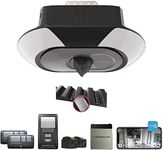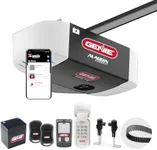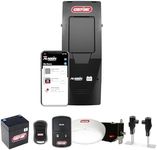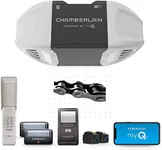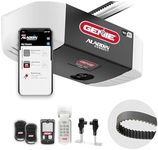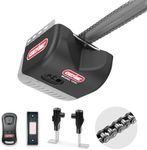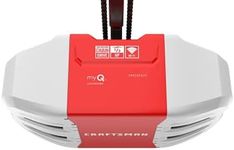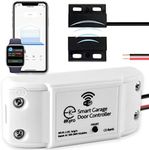Buying Guide for the Best Garage Door Openers
Choosing the right garage door opener can make a big difference in your daily convenience, security, and home automation. When selecting a garage door opener, it's important to think about the type of door you have, how often you'll use the opener, the noise level you're comfortable with, and any smart features or backup options you might find useful. Understanding the key specifications will empower you to select a model that truly fits your needs and lifestyle.Drive TypeThe drive type refers to the mechanism that moves your garage door up and down. The three main types are chain drive, belt drive, and screw drive. Chain drives are generally the most affordable and durable, but they tend to be noisy, which can be a problem if your garage is connected to or below living spaces. Belt drives use a rubber belt instead of a chain, making them much quieter and smoother, ideal if noise is a priority. Screw drives use a threaded rod and offer a balance of speed, power, and quietness but may need more maintenance. Consider your sensitivity to noise and the location of your garage when deciding which drive type is right for you.
Horsepower/Power RatingHorsepower (HP) or power rating tells you how strong the motor is. Openers typically range from 1/3 HP to 1-1/4 HP or sometimes more. Lighter single doors often work fine with lower HP, while heavier or double doors, and older wooden doors, may require more power. If your door is large and heavy, a higher HP motor is more durable and less likely to wear out quickly. Choosing the right power level depends on the size and weight of your garage door—always check your door specifications before deciding.
Noise LevelNoise level refers to how much sound the opener makes when operating. Chain drive systems are typically louder, whereas belt drives are quieter and smoother in operation. Screw drives fall somewhere in between. If your garage shares a wall with living areas or if you want a peaceful environment, aim for an opener designed for quieter operation. Always consider who will be affected by the garage door noise, especially if you have bedrooms or offices adjacent to the garage.
Safety and Security FeaturesSafety and security features include things like auto-reverse mechanisms, rolling code technology, and manual release. Auto-reverse stops the door from closing if an object or person is detected, providing safety for your family and pets. Rolling code technology changes the code each time you use the remote, helping to prevent unauthorized access and improving security. Think about whether you'll need extra remotes, keypads, or compatibility with home security systems when evaluating safety and security specs.
Compatibility and Smart FeaturesCompatibility and smart features refer to whether the opener works with your existing garage door and the availability of digital controls. Some models offer smartphone connectivity, allowing you to open or close the door remotely, set schedules, and monitor status. Look for compatibility with your current home automation systems or virtual assistants, if that's important to you. Consider if you want features like remote monitoring, alerts, or integration with other smart home devices based on your tech preferences.
Backup Power OptionsBackup power options are features that allow the opener to function during power outages, usually via a built-in battery backup. This is helpful if you live in an area where power outages are common or if being able to get in and out during a blackout is vital for you. Decide whether this is a must-have based on how much you rely on your garage door daily and your local power reliability.
